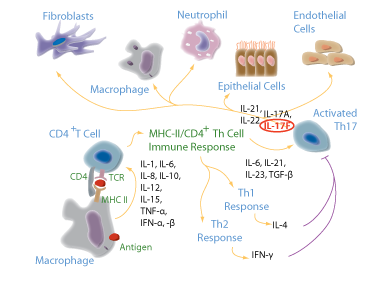|
|
|
Immunoassays | Inflammation & Cytokines
|
|
Inflammation & Cytokines
Cytokines are a broad range of structurally diverse molecular families and individual proteins that perform functional roles regulating immune system responses. Cytokines operate in extensive and complex signaling networks, and are often pleiotropic molecules with diverse cell-type specific activities, including immune cell activation, differentiation, hematopoiesis, apoptosis, cell migration, and cell proliferation. Through this complex signaling network, they regulate virtually all aspects of both innate and adaptive immunity, making them important biomarkers for monitoring human disease.
Singulex offers an extensive menu of high-definition immunoassays for inflammatory cytokines and chemokines, developed for use on the Erenna® Immunoassay System. Our proprietary single-molecule counting technology enables accurate baseline quantification of low-abundance cytokines and other inflammatory markers, providing high-definition answers to resolve efficacy and safety, investigate mechanism of action, or be used as more sensitive surrogate endpoints for clinical studies.
Product Listing
|
Biological Pathways
|
FIGURE 1. T helper 17 cells (Th17) are a newly discovered subset of T helper cells producing interleukin 17 (IL-17), and are also associated with the effector cytokines IL-21 and IL-22. They are considered developmentally distinct from Th1 and Th2 cells, and excessive proliferation of Th17 cells are thought to play a key role in development of severe autoimmune diseases, including rheumatoid arthritis, Crohn's disease, multiple sclerosis, psoriasis, autoimmune uveitis, and juvenile diabetes. In humans, a combination of TGF-ß, IL-1ß and IL-23 have been shown to induce Th17 differentiation from naive T cells, whereas interferon gamma (IFNγ) and IL-4 (which stimulate Th1 and Th2 differentiation) negatively regulate Th17 differentiation.
|
 |
 FIGURE 2. The Type 1 (Th1) cytokine response is carried out by macrophages, and is characterized by increased expression of interferon-γ (IFN-γ) and tumor necrosis factor-beta (TNF). IFN-γ increases the production of interleukin-12 by dendritic cells and macrophages, which further stimulates production of IFN-γ in helper T cells, thereby promoting the Th1 profile. IFN-gamma also inhibits the production of cytokines such as interleukin-4, an important cytokine associated with the Type 2 response, and thus it also acts to preserve its own response. The Type 2 response is carried out by B-cells, and is characterized by increased expression of interleukin-4, interleukin-5, interleukin-6, interleukin-10, and interleukin-13. The Th2 response is promoted through the combined functions of IL-4 (which promotes the production of other Th2 cytokines) and IL-10 (which inhibits a variety of cytokines, including IL-2, IL-12 and IFN-γ).
For more information about our assay services and partnering opportunities, please email our business development at busdev@www.singulex.com or call us at 1-510-995-9040.
|
|


